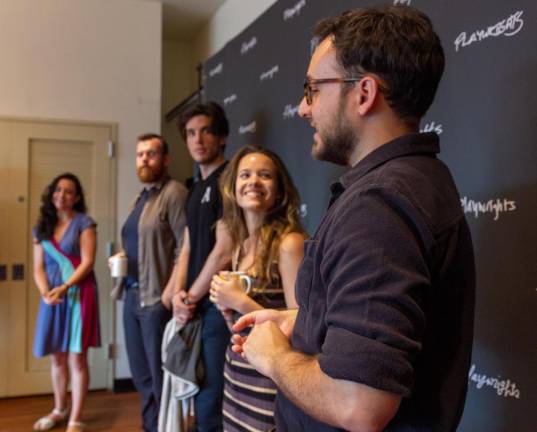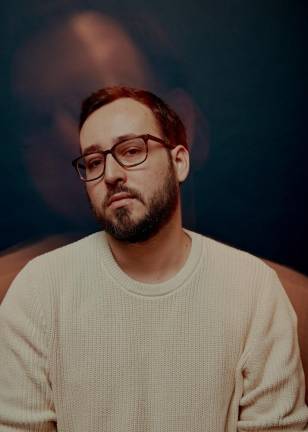'Theater Will Come Back'
A talk with playwright Will Arbery, a recent winner of the prestigious Whiting Award


In the New York theater world, Republicans are rarely seen onstage. Broadway and off-Broadway is often the domain of liberal people, and their ideas and ideologies dominate what we see in theaters every season. But playwright Will Arbery is changing the status quo. His play "Heroes of the Fourth Turning," about five Republicans at a small Catholic college in Wyoming, sparked conversation in both right- and left-wing circles when it premiered last season at Playwrights Horizons.
Everyone from the New York Times to the National Review had a strong opinion about the play, which forced audiences to listen to a conservative political perspective without a liberal rebuttal. For his work on this play and others, Arbery has recently won a Whiting Award, a $50,000 prize given to each of ten emerging writers in fiction, nonfiction, poetry and plays. We sat down with him last week to talk about the award, coronavirus and the powerful link between religion and theater.
Congratulations on winning the Whiting Award! That's a huge deal.
Thank you.
How did you find out that you won?
They called me in late January. I was in a hotel room in Chicago, because I was there for rehearsals for a play of mine. And I let the call go to voicemail, because I didn't recognize the number, and then I heard who the voicemail was from, and I was like, "Oh, shit." I called them back, and they let me know. And it was a huge surprise, because it's the kind of award where you don't know that you're nominated; you don't even know that they're reading your work, and listening to you. It's just out of the blue. So yeah, it was a wonderful surprise.
What's the hardest thing about being a playwright?
The hardest thing about being a playwright is the same as the best thing about being a playwright, which is that the performance is different every night. And then it's gone forever. If you're working in any other medium, like film, or music, or visual art, or if you're just a writer, there's an element of being able to control the final product, and sort of freeze it in time, even though history and the years will change how it's perceived. It can be frozen.
For theater-makers and dance-makers, that just isn't the case. And that's a very beautiful thing, and that's, I think, a very spiritual thing. But it can also be extremely frustrating if you are a perfectionist or a control freak, which I have tendencies towards. It can sort of feel like you are removed from the final experience in a way. You're trusting actors and designers and directors and audiences to make it what you've intended. The fact that it'll never be exactly what you intended and you have to make peace with all the variables.
As beautiful as that element is, it also can be really painful.
Your play, "Heroes of the Fourth Turning," has a lot of conservative political content in it. Were you nervous to present it in New York?
I was a bit nervous about it. I had never seen a play that was doing what this play was doing, so I had no precedent for how this was gonna go. There was a certain sense in which I was worried that I would be run out of town. And I think even beyond that, I was just more genuinely worried that the play might alienate queer people, or people of color, or transgendered people. I really didn't want to alienate them, despite the viewpoints of the characters. And I wanted them to recognize that this play was telling really hard truths about really complicated people. And luckily, a lot of the people that I spoke to felt that way, and recognized that, and were grateful for that.
There are people out there who feel that the characters' views and beliefs in the play should not have the platform that you gave them. What would you say to these people?
I guess it just depends on what your definition of a platform is. I believe that a theatrical stage is a space for art. And that what I created was intended to be a work of art rather than something with a clear point-by-point political message, or a soapbox. That's not the kind of work that I'm interested in making. And I also think that it's a really limited view of art to only let it be something that makes it easy on the audience, or to have art only be something that necessarily endorses or condemns. I think there's such a thing as an in-between place. And maybe people would've been more comfortable if the play had more clearly condemned these characters, but it would have made it less of a good play, I think.
Several famous playwrights, such as John Patrick Shanley and Ayad Akhtar, grew up very religious like yourself. Why do you think so many playwrights come from religious backgrounds, and what is the link between religion and theatre?
There are a lot of theater-artists who refer to theater as being a kind of church. And I think that description is very apt. There's a lot about the ritual of it, gathering, and sort of celebrating together, the communal nature of it. I think that all of those things are interconnected. For me personally, growing up Catholic, I loved the mass on an aesthetic level. I found the ritual of it very soothing. The forward-facing nature of it: the stage was right there, and the costumes were fabulous ... It's pretty easy to see how I would be drawn to an art form that involves live ritual.
The coronavirus has recently swept this country, and upended all of our lives. How has the pandemic personally affected you, and how do you think it has affected the theater community?
It's a really scary time. I think no one knows what's gonna happen. So many of my friends have had their shows canceled or postponed. Actors who already were working in a survival job, like at restaurants or for catering, so that they could support this off-Broadway play they were doing, suddenly both of those opportunities are pulled out from under them. It's a really precarious time, it's also a really beautiful time, because the community's really rallying to try to make sure that everyone's okay. But no one has any idea of when we're gonna be able to start up again.
But I'm choosing to remain optimistic. I know that theater will come back — it's just a question of when.